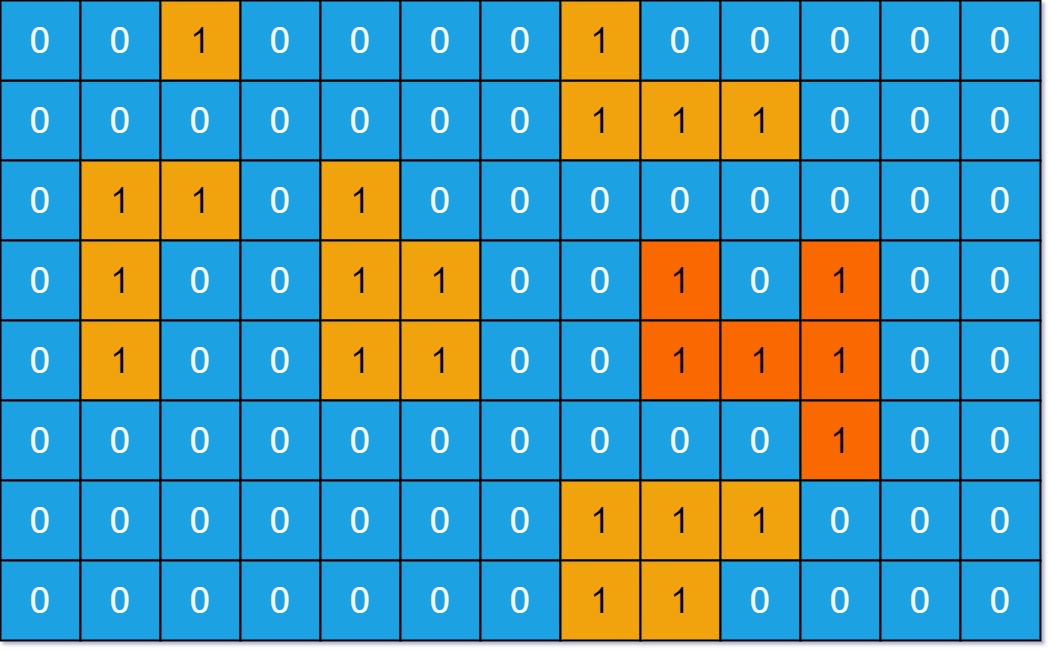Algorithm
Problem Name: 695. Max Area of Island
You are given an m x n binary matrix grid. An island is a group of 1's (representing land) connected 4-directionally (horizontal or vertical.) You may assume all four edges of the grid are surrounded by water.
The area of an island is the number of cells with a value 1 in the island.
Return the maximum area of an island in grid. If there is no island, return 0.
Example 1:

Input: grid = [[0,0,1,0,0,0,0,1,0,0,0,0,0],[0,0,0,0,0,0,0,1,1,1,0,0,0],[0,1,1,0,1,0,0,0,0,0,0,0,0],[0,1,0,0,1,1,0,0,1,0,1,0,0],[0,1,0,0,1,1,0,0,1,1,1,0,0],[0,0,0,0,0,0,0,0,0,0,1,0,0],[0,0,0,0,0,0,0,1,1,1,0,0,0],[0,0,0,0,0,0,0,1,1,0,0,0,0]] Output: 6 Explanation: The answer is not 11, because the island must be connected 4-directionally.
Example 2:
Input: grid = [[0,0,0,0,0,0,0,0]] Output: 0
Constraints:
m == grid.lengthn == grid[i].length1 <= m, n <= 50grid[i][j]is either0or1.
Code Examples
#1 Code Example with C++ Programming
Code -
C++ Programming
class Solution {
public:
int maxAreaOfIsland(vector<vector<int>>& grid) {
if(grid.empty()) return 0;
int maxArea = 0, m = grid.size(), n = grid[0].size();
for(int i = 0; i < m; i++)
for(int j = 0; j < n; j++)
if(grid[i][j]){
int area = 0;
DFS(grid, i, j, m, n, area, maxArea);
}
return maxArea;
}
void DFS(vector < vector<int>>& grid, int r, int c, int m, int n, int& area, int& maxArea){
if(r < 0 || c < 0 || r == m || c == n || grid[r][c] == 0){
maxArea = max(maxArea, area);
return;
}
area++;
grid[r][c] = 0;
DFS(grid, r + 1, c, m, n, area, maxArea);
DFS(grid, r - 1, c, m, n, area, maxArea);
DFS(grid, r, c + 1, m, n, area, maxArea);
DFS(grid, r, c - 1, m, n, area, maxArea>;
}
};
Input
Output
#2 Code Example with Java Programming
Code -
Java Programming
class Solution {
private final int[][] DIRS = {{1, 0}, {0, 1}, {0, -1}, {-1, 0}};
public int maxAreaOfIsland(int[][] grid) {
int area = 0;
int rows = grid.length;
int cols = grid[0].length;
boolean[][] visited = new boolean[rows][cols];
for (int i = 0; i < rows; i++) {
for (int j = 0; j < cols; j++) {
if (!visited[i][j] && grid[i][j] == 1) {
Queue<int[]> queue = new LinkedList<>();
int currArea = 0;
queue.add(new int[]{i, j});
visited[i][j] = true;
while (!queue.isEmpty()) {
int[] removed = queue.remove();
currArea++;
for (int[] dir : DIRS) {
int x = removed[0] + dir[0];
int y = removed[1] + dir[1];
if (x >= 0 && y >= 0 && x < rows && y < cols && !visited[x][y] && grid[x][y] == 1) {
queue.add(new int[]{x, y});
visited[x][y] = true;
}
}
}
area = Math.max(area, currArea);
}
}
}
return area;
}
}
Input
Output
#3 Code Example with Javascript Programming
Code -
Javascript Programming
const maxAreaOfIsland = function(grid) {
let res = 0
const seen = []
for(let i = 0; i < grid.length; i++) {
seen[i] = []
}
for(let i = 0; i < grid.length; i++) {
for(let j = 0; j < grid[0].length; j++) {
res = Math.max(res, area(i, j, seen, grid))
}
}
return res
};
function area(r, c, seen, grid) {
console.log(grid)
if (r < 0 || r >= grid.length || c < 0 || c >= grid[0].length || seen[r][c] || grid[r][c] == 0) return 0;
seen[r][c] = true;
return (1 + area(r+1, c, seen, grid) + area(r-1, c, seen, grid) + area(r, c-1, seen, grid) + area(r, c+1, seen, grid));
}
console.log(maxAreaOfIsland([[1,1,0,0,0],[1,1,0,0,0],[0,0,0,1,1],[0,0,0,1,1]]))
console.log(maxAreaOfIsland([[1,0],[1,1]]))
console.log(maxAreaOfIsland([[1,1],[1,0]]))
Input
Output
#4 Code Example with Python Programming
Code -
Python Programming
class Solution:
def maxAreaOfIsland(self, grid):
m, n = len(grid), len(grid and grid[0])
def explore(i, j):
grid[i][j] = 0
return 1 + sum(explore(x,y) for x,y in ((i-1,j),(i+1,j),(i,j-1),(i,j+1)) if 0<=xInput
Output
#5 Code Example with C# Programming
Code -
C# Programming
using System;
namespace LeetCode
{
public class _0695_MaxAreaOfIsland
{
public int MaxAreaOfIsland(int[][] grid)
{
var uf = new UnionFind(grid);
int m = grid.Length;
int n = grid[0].Length;
for (int i = 0; i < m; i++)
for (int j = 0; j < n; j++)
if (grid[i][j] == 1)
{
if (i - 1 >= 0 && grid[i - 1][j] == 1)
uf.Union(i * n + j, (i - 1) * n + j);
if (i + 1 < m && grid[i + 1][j] == 1)
uf.Union(i * n + j, (i + 1) * n + j);
if (j - 1 >= 0 && grid[i][j - 1] == 1)
uf.Union(i * n + j, i * n + j - 1);
if (j + 1 < n && grid[i][j + 1] == 1)
uf.Union(i * n + j, i * n + j + 1);
}
return uf.RankMax();
}
public class UnionFind
{
private int count = 0;
private int rankMax = 0;
private int[] parents;
private int[] ranks;
public UnionFind(int[][] grid)
{
count = 0;
int m = grid.Length;
int n = grid[0].Length;
parents = new int[m * n];
ranks = new int[m * n];
for (int i = 0; i < m; i++)
for (int j = 0; j < n; j++)
{
if (grid[i][j] == 1)
{
parents[i * n + j] = i * n + j;
count++;
ranks[i * n + j] = 1;
rankMax = 1;
}
}
}
public int Find(int index)
{
if (parents[index] != index)
parents[index] = Find(parents[index]);
return parents[index];
}
public void Union(int index1, int index2)
{
var pIndex1 = Find(index1);
var pIndex2 = Find(index2);
if (pIndex1 != pIndex2)
{
if (ranks[pIndex1] >= ranks[pIndex2])
{
parents[pIndex2] = pIndex1;
ranks[pIndex1] += ranks[pIndex2];
rankMax = Math.Max(ranks[pIndex1], rankMax);
}
else
{
parents[pIndex1] = pIndex2;
ranks[pIndex2] += ranks[pIndex1];
rankMax = Math.Max(ranks[pIndex2], rankMax);
}
count--;
}
}
public int RankMax()
{
return rankMax;
}
public int Count()
{
return count;
}
}
}
}
Input
Output
